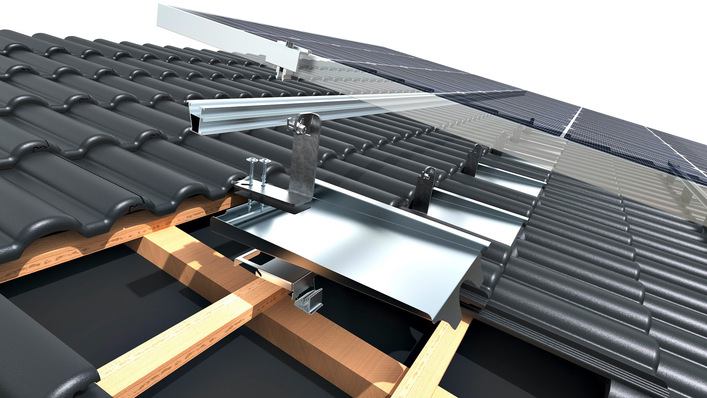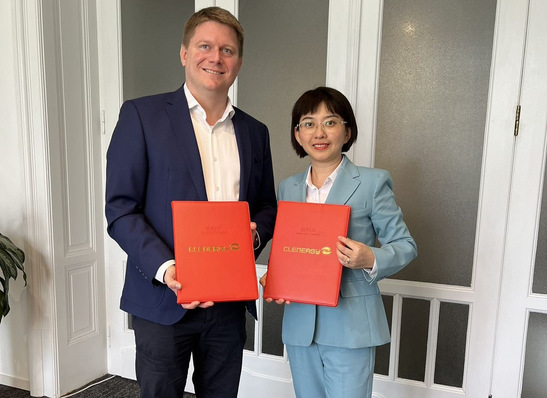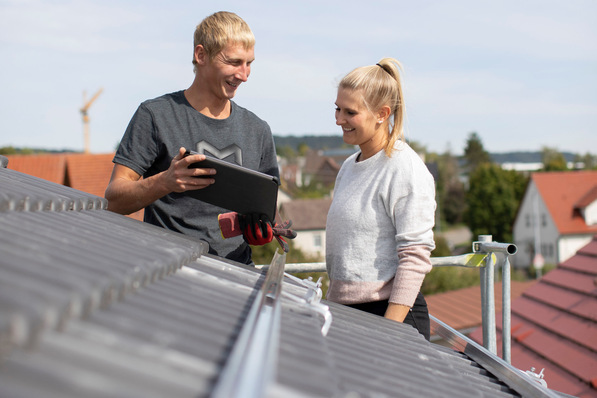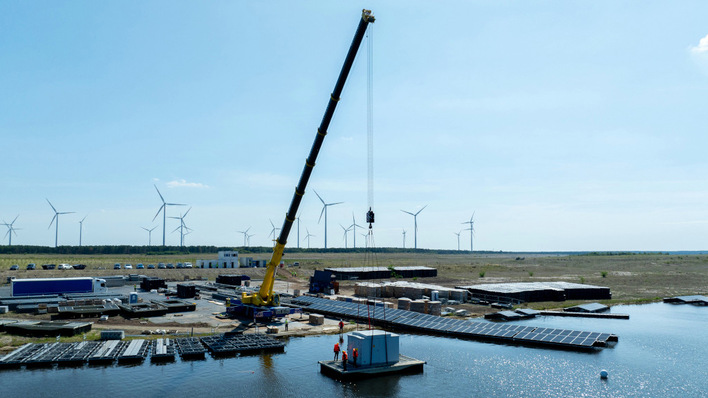The market is still dominated by small solar generators for private consumers, but as of this year, self-consumption is gaining in leverage and is beginning to have an impact on the German private sector. An increasing number of companies realise that having solar PV on their roofs can make them independent of energy prices. Solar energy and competitiveness go hand in hand. This is why larger roofs – of medium-sized businesses and industry – are increasingly fitted with solar generators.
But the demands on the racks and structures are very high, much higher than for the roof of a private residence: Often sensitive production goes on beneath them or valuable products are stored, moved and handled there. “That is why we developed a secure and high-quality mounting system which meets the highest standards,” Markus Ziegler of T.Werk in South-German Neu-Ulm says. “Of course, we also offer aluminium systems, but Triton, our new aerodynamic system for flat roofs is made from strip galvanised steel. It is particularly durable, and it comes with a 12-year product warranty.”
They use strip galvanised steel immersion-coated in Z600 alloy at the steelworks. With a zinc layer of 600 grams per square metre on both sides, the coating is especially thick and tough. This makes white and red rust a thing of the past. The same material is also used to make the guardrails on motorways.
Not much heavier than aluminium
Steel structures on a flat roof? That is new. So far, very light-weight systems made from aluminium have been mostly installed on roofs. “The thickness of the steel used for the Triton system ranges from 1.2 to 1.5 millimetres,” Markus Ziegler explains. “A comparable system made from aluminium would require thicknesses of at least two to three millimetres. That is why our system is only a little heavier.”
The mounting system was tested and optimised at the Institute for Industrial Aerodynamics in Aachen. The surface load starts at six kilograms per square metre.
For the south-facing system, two elevations are possible: ten and 15 degrees of inclination. The east-west-facing system allows an inclination of 12 degrees. Triton is suitable for all common types of flat roof covering: foil, bitumen, gravel, vegetation or trapezoidal sheet metal. During the mounting process, the fully pre-assembled elevation triangles simply need to be unfolded and fixed using one bolt. The alignment of the following triangles happens with the help of a special gauge. This reduces the time spent on assembly and measuring to a minimum. Drilling and cutting while on the roof is no longer necessary.
The support structures are linked up in a row by special rigid rail connectors held together by double bolts. This allows multiple panels to better spread wind loads and thus to reduce overall ballast. The bottom rail can also be used as an electrical conduit, even permitting MC4 plugs to be fed through the rails and underneath the bolts.
Special cable troughs running from triangle to triangle beneath the panels allow the laying of panel-connecting cables as well as string cables. “Nobody will ever have to zip-tie cables again and they also won't sag,” Markus Ziegler explains. “The Triton system makes it possible to have the electrical conduits completely metal-covered all the way to the end of the panel array, without the need for extra materials.”
Triton is a hit
The new system seems to be a hit: Sales started in March and the first units will be delivered in July. Demand is high. The first megawatt-scale projects are already pending.
Markus Ziegler used to be the technical director at Green Factory for five years – in charge of sub-structures for PV units. Then he spent half a year at Actensys as a project consultant. T.Werk came onto the market in 2012. They have a wide-ranging product portfolio for pitched and flat roofs as well as greenfield systems. In-roof or tracker systems are not available.
A goal of 50 megawatts
Last year, T-Werk were able to produce around 30 megawatts’ worth of solar racks. This year the goal is to hit 50 megawatts. They hope that Triton will allow them to expand their market share in the roof segment, most of all for larger commercial roofs which is particularly promising. So far, Germany has been the main market, but Northern Ireland, England, Poland, Austria, Denmark and Switzerland are becoming more important. T.Werk is currently only active in the European market, but some first projects beyond Europe are also in the offing. At the Intersolar in Munich, T.Werk shares a stand with Solarmax from Ellzee. As of 2014, T.Werk is certified according to ISO 9001:2008.
There are six full-time staff at the headquarters in Neu-Ulm on an industrial estate on the Bavarian bank of the Danube, where the sales offices and warehouses are located. Manufacturing, where smaller aluminium parts such as clamps, adapters and linkages are produced, is situated at another location in Bavaria. This is also where custom solutions are put together and some of the components of, among others, the Trition system are pre-assembled.
Customers making unusual requests
Sometimes customers ask for quite outlandish solutions: T.Werk has already implemented a number of rather elaborate custom structures. Façade installations have been built on occasion. “If a customer asks for it and it’s technically feasible, we try to implement anything,” Markus Ziegle remarks. “We provide custom profiles according to the customer’s needs or anodise aluminium frames in specific colours.” The largest project so far was an 8.6 megawatt solar park in northern Germany.
Too, T.Werk will soon offer a free piece of software which can be used to allow customers to plan their projects better and design the racks. It can be used to generate roof layouts and put together parts lists and calculate prices as well as plan assembly and calculate ballast.
Distribution via resellers
T.Werk exclusively sells their units to business customers. Thus (solar) installation companies, electricians, engineering firms, project planners and resellers all belong to the customer base – just not end customers. If requested, the company is also able to refurbish an entire solar park; as was the case at a greenfield site on Mallorca. Furthermore, T.Werk offers other services, including pile driving as well as rack and panel assembly. (HS)
Much details for professional installers, aye? Read more here:
S:Flex’ way of panel installation: One type of clamp, no rails
For more useful products for module installation, look here.







